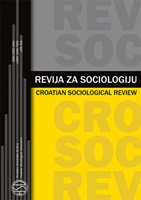Ludwik Fleck: pionir sociologije znanosti u okviru idejnih nasljednika
Ludwik Fleck: The Pioneer of Sociology of Knowledge in the Context of His Conceptual Influence
Author(s): Mislav UzunićSubject(s): Social Philosophy, Philosophy of Science, History and theory of sociology, Applied Sociology, Social Theory
Published by: Hrvatsko sociološko društvo
Keywords: Ludwik Fleck; thought collective; thought style; philosophy of science; sociology of science;
Summary/Abstract: The paper examines Ludwig Fleck's theory with a particular emphasis on its application to the sociological analysis of knowledge and science. Fleck's position is then compared to Thomas Kuhn's theory and the theory of the Edinburgh School of Sociology (SSK) to delineate their conceptual and methodological differences in defining the social aspects of science. Throughout the 20th century, there exists a continuous axis of sociological analysis of science and knowledge, carried out by Fleck, Kuhn, and SSK. However, the paper argues that Fleck's and Kuhn's theories are fundamentally aligned due to their analysis of rational factors underlying the scientific decision-making process, while SSK deviates with its radical interpretation of Kuhn, assuming a strong influence of irrational and non-scientific factors on scientific processes. Therefore, it is necessary to differentiate between what Fleck and Kuhn mean by 'social' and what SSK practitioners mean by it. Fleck and Kuhn refer to the relations within scientific collectives and among scientists themselves, which are presumably based on epistemic factors, primarily in knowledge shared through rationality and evidence. On the other hand, SSK members extend the analysis to the relationship between science and the broader social context in order to identify irrational and non-scientific factors within these relations. The emphasis on irrational factors in science constitutes radicalism, as well as the originality of SSK's application of its own sociological framework, which has led to criticism that this approach represents a form of scientific anti-realism that relativises the rationality and success of science.
Journal: Revija za sociologiju
- Issue Year: 53/2023
- Issue No: 2
- Page Range: 213-237
- Page Count: 25
- Language: Czech

